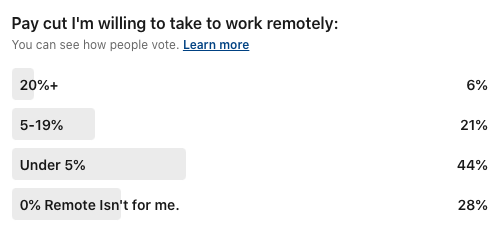A new study says 65% of Americans are willing to take a pay cut to work remotely! I thought that seemed high. Also, the concept didn’t really make sense to me. Why should someone take a pay cut to work remotely?
So, I decided to do a poll of my own on LinkedIn! It’s currently live, but it got massive traffic, and here are some of the initial results:

Are People Really Willing to Take a Pay Cut to Work Remotely?
Yes, and no.
The vast majority of folks commented that there is no reason for someone to take a pay cut. But, my guess is, based on the results, if push came to shove, they probably would be willing to take a pay cut to work in the environment of their choosing.
So, you have what people say, and then you have what people actually do when faced with a real choice.
Also, I had a number of folks tell me my poll was flawed (well, of course, it is!) because I didn’t give the option of saying “No, I won’t take a pay cut to work remote, and remote is for me”, and “I expect a pay increase to work remote”. The problem is LinkedIn only gives me 4 options for poll results. So, it’s fun, but it’s limited.
Should someone take a pay cut to work remotely?
So, a lot of pro-remote folks got a bit defensive in the comments over this. I wasn’t personally asking anyone to take a pay cut. I was asking (and actually it wasn’t even me asking, I was just reacting to the new survey linked above) is working remotely valuable enough to you that you would be willing to take less pay to work in a remote environment?
I’m actually in the camp that if someone works remotely, their organization should probably be discussing with them the cost they face working remotely verse working on-premise. There are probably cases all across the spectrum of three options:
- It costs me more to work remotely, and my company should pay me more because of this fact, or force me back to work because it’s more cost effective, or I’m willing to take less pay because of this difference. (probably very rare)
- It costs me the same as working on-premise, and my company should at least pay me what it costs them to house me on-prem.
- It actually costs less for me to work remotely, and my company should probably give me a pay raise because I’m saving them so damn much money!
At the end of the day, everyone has a choice.
Some organizations will ask their teams to come back on-premise. This decision will be made after a lot of leadership discussion, and a decision will be made this is what’s best for the health of our organization. As an employee, you might not agree with that and thank god we live in America and are free to make the choice to work someplace else if you don’t agree with that.
Some organizations will decide to go full remote with their teams. Some will succeed, some will stay the same, some will fail. That’s the reality of being a leader and making leadership decisions. Not one of these decisions is actually right or wrong until we know the outcome.
I do think organizations, who are in a competitive talent fight, are going to have to add more flexibility. This does not mean full remote, but it does mean probably be way more flexible than they are used to being. I also think employees in general who work remotely have a rude awakening coming when it comes to technology monitoring and measured performance outcomes.
Organizations tend to bottom line. If it works, awesome, how do we do more of it. If it’s not working, we’re going to change, and find out what’s wrong. Too many employees believe they can perform better working remotely, but when I speak to CHRO’s, CFO”s, and CEO’s, the numbers have yet to reflect that that performance level. Some do perform better, but many don’t.
The question remains, would you take a pay cut to work remotely vs. on-prem?

Strictly from the standpoint of “how much money would I be willing to sacrifice in order to not have to commute to and from work each day,” it depends on the commute in question. My workplace is a solid half hour drive each way, which will be more like an hour when traffic is in full effect. Saving two hours sitting in traffic every day is worth thousands to me. Plus think of the money you are saving on gas, wear and tear on your vehicle, etc. Plus additional time getting ready every day for in-person work.
In terms of work performance, one thing I have noticed lately is that every vendor seems to be slow and not very responsive. Software services – slow, advertising platforms – slow, ATS – slow, developers – slow, agencies – slow. Getting a response often takes at least a day. Then you have to follow up days later to ensure it has been done. I realize this is one person’s experience, but it feels like everybody is stuck in molasses, and accountability seems to be less. Which sucks, because I like the flexibility and convenience of remote work, but as you have pointed out in other posts, a sizable percentage of humans will take as much slack as they are given.
Nope, but I also don’t want to work remotely. My current role allows me to work remotely when needed (sick kids, sick me, need to do heads down work and not be interrupted, etc.) and that is the perfect arrangement for me.
Generally, if something is really important to me, I am willing to take a pay cut for that thing. Remote work is just not one of those things.
Flexibility is the new best fringe benefit!
T